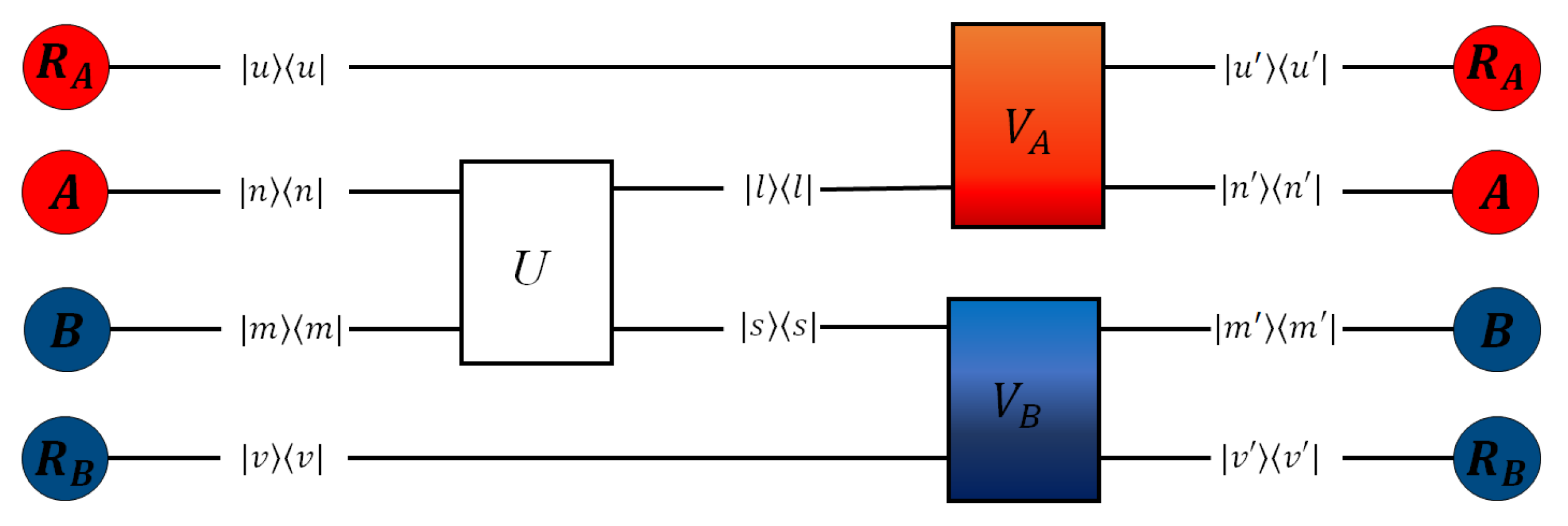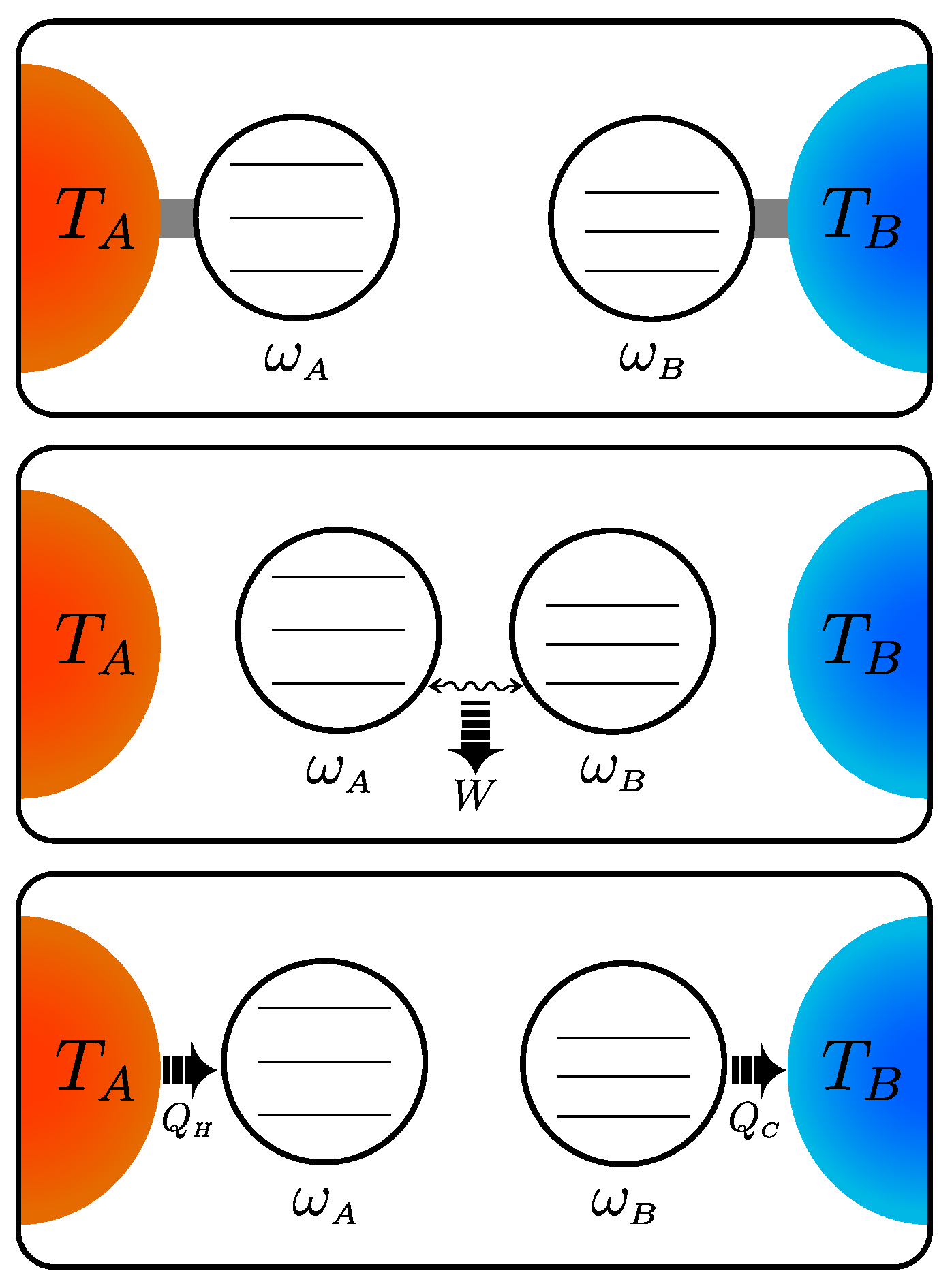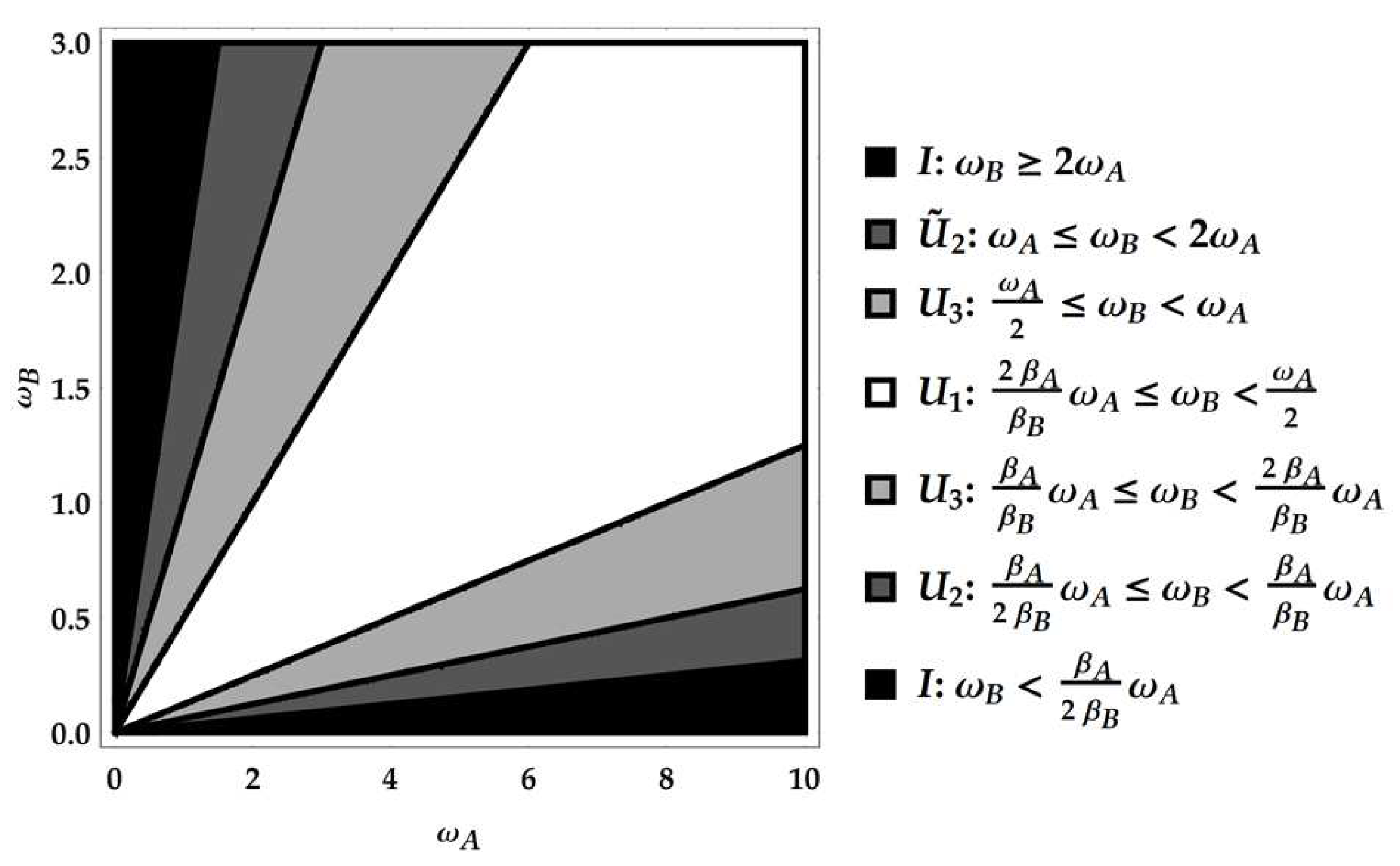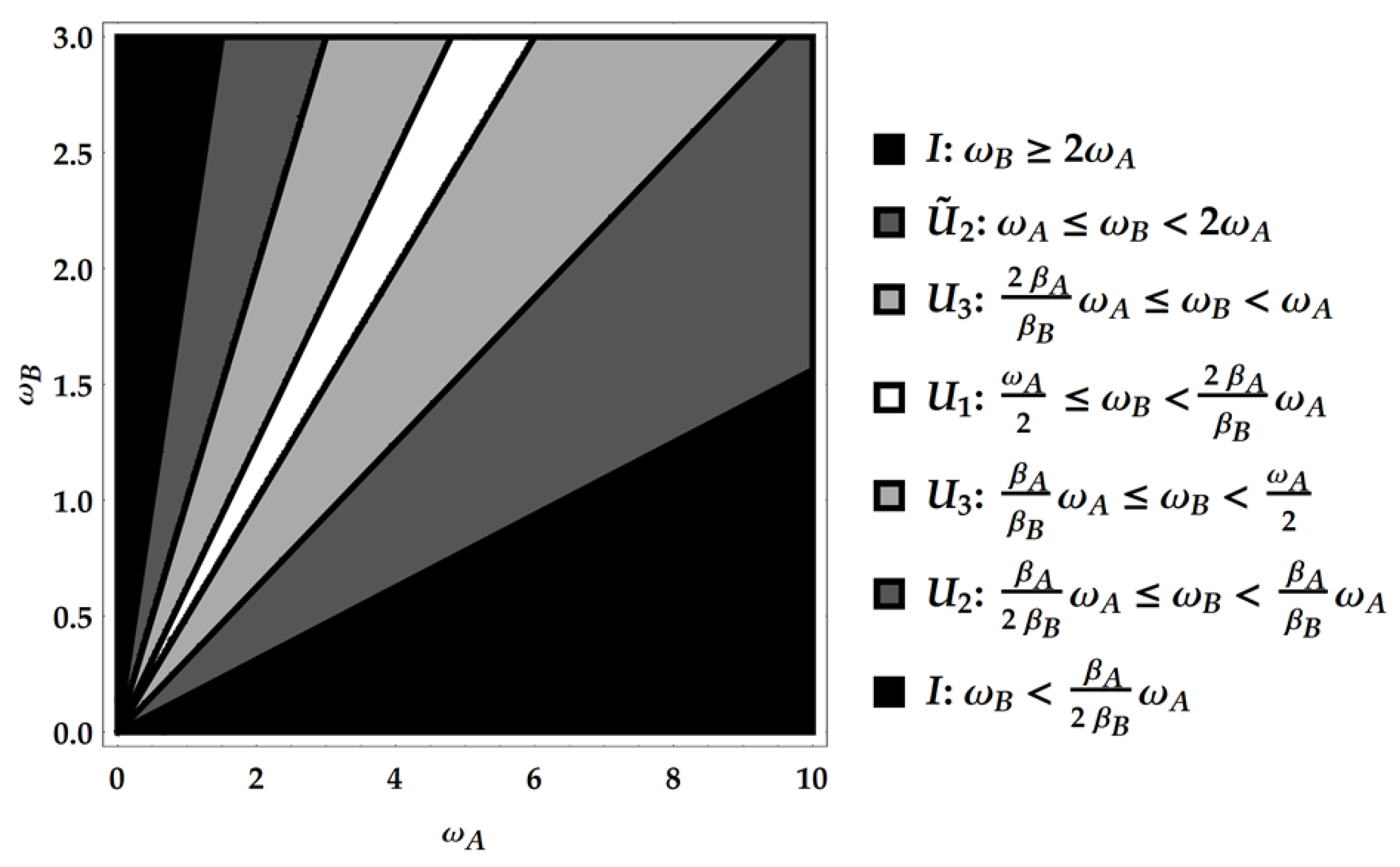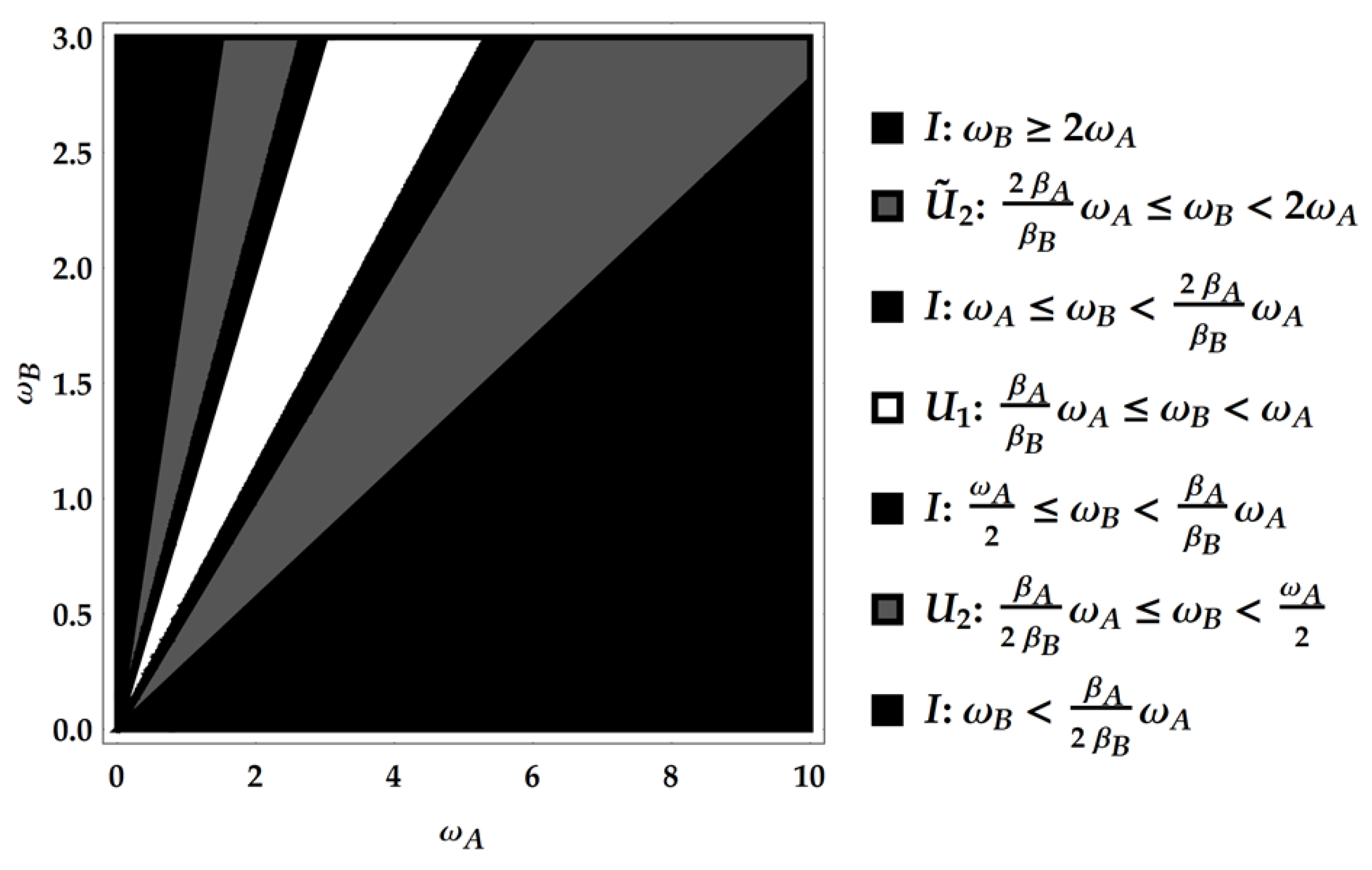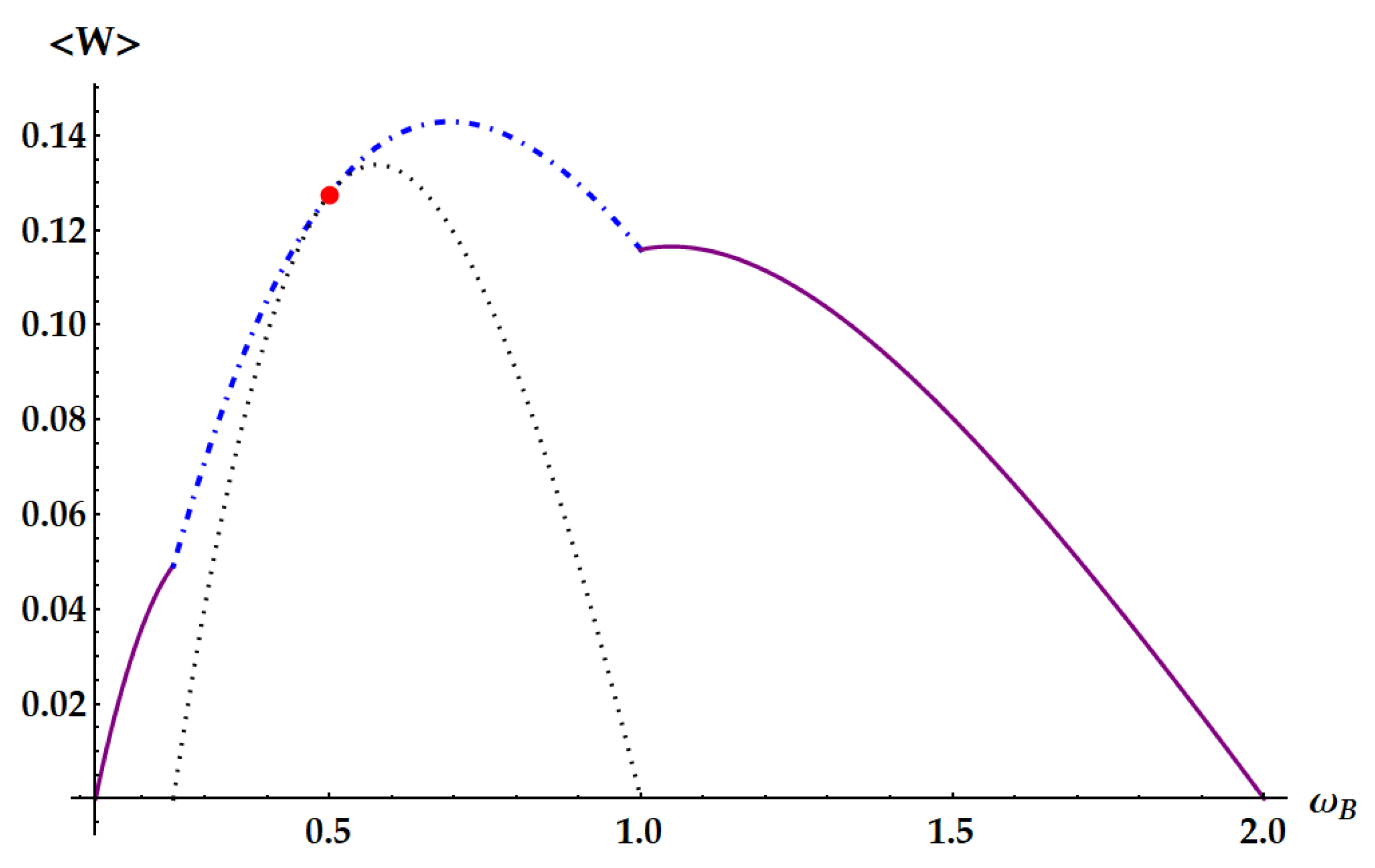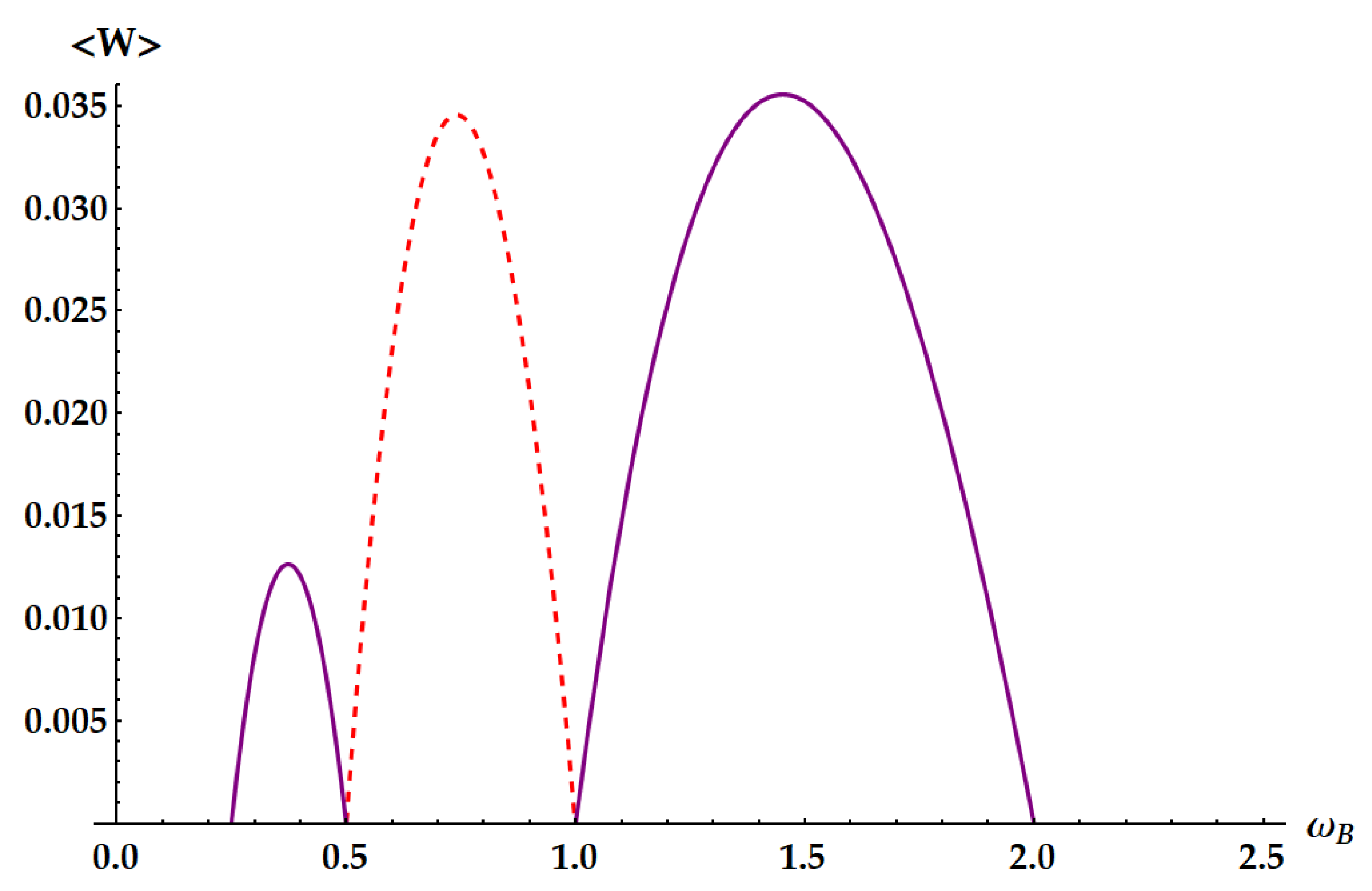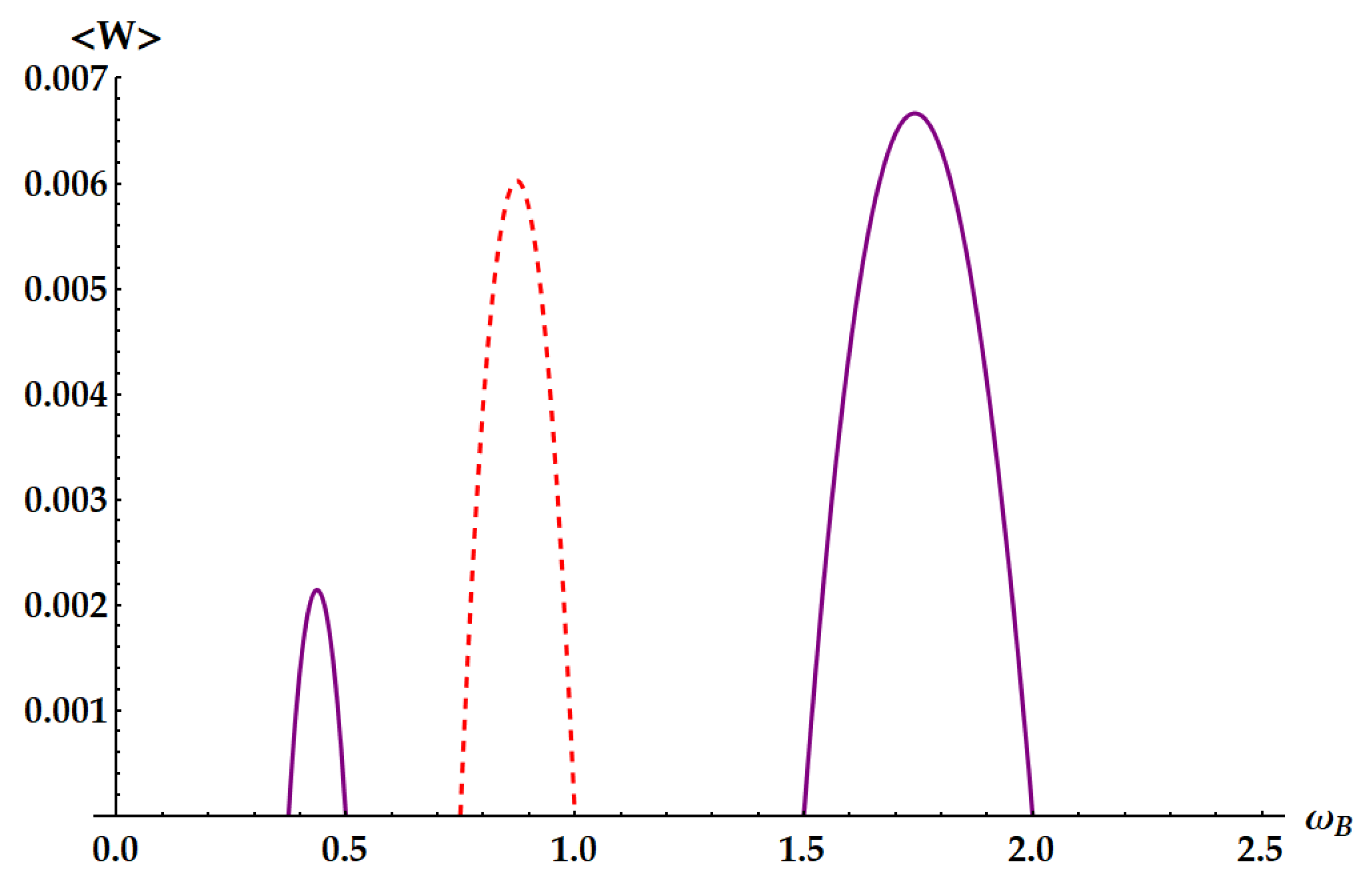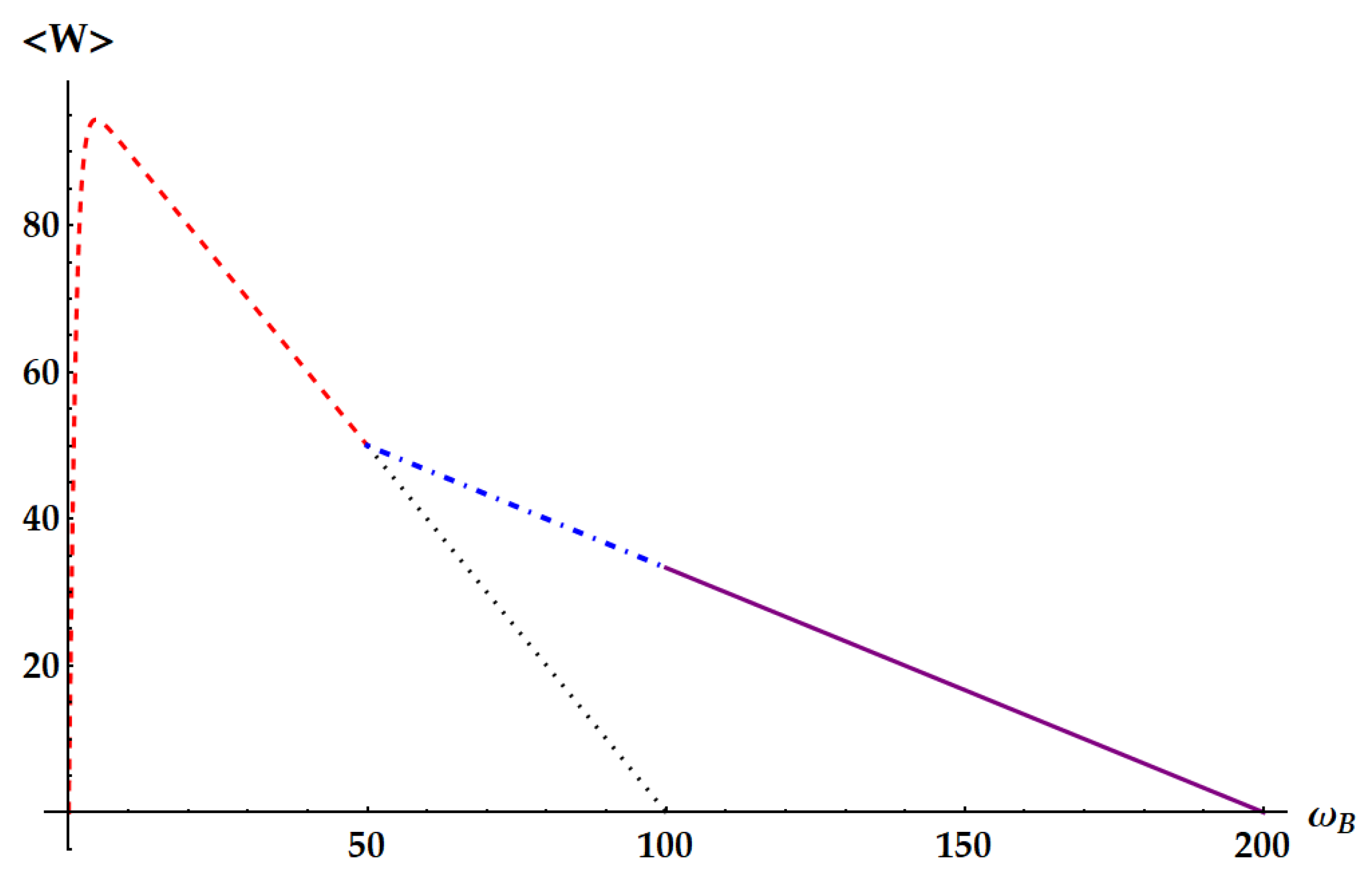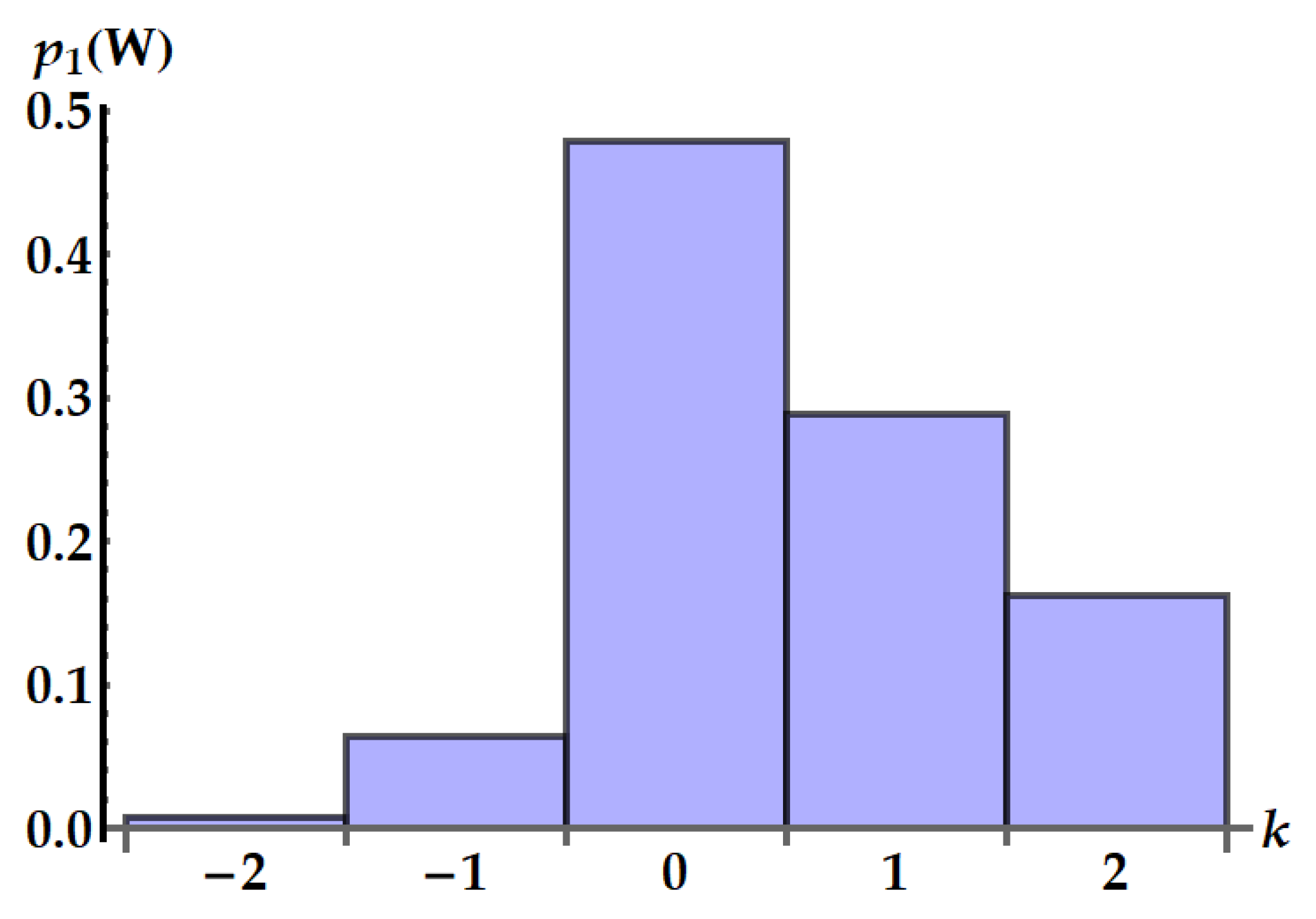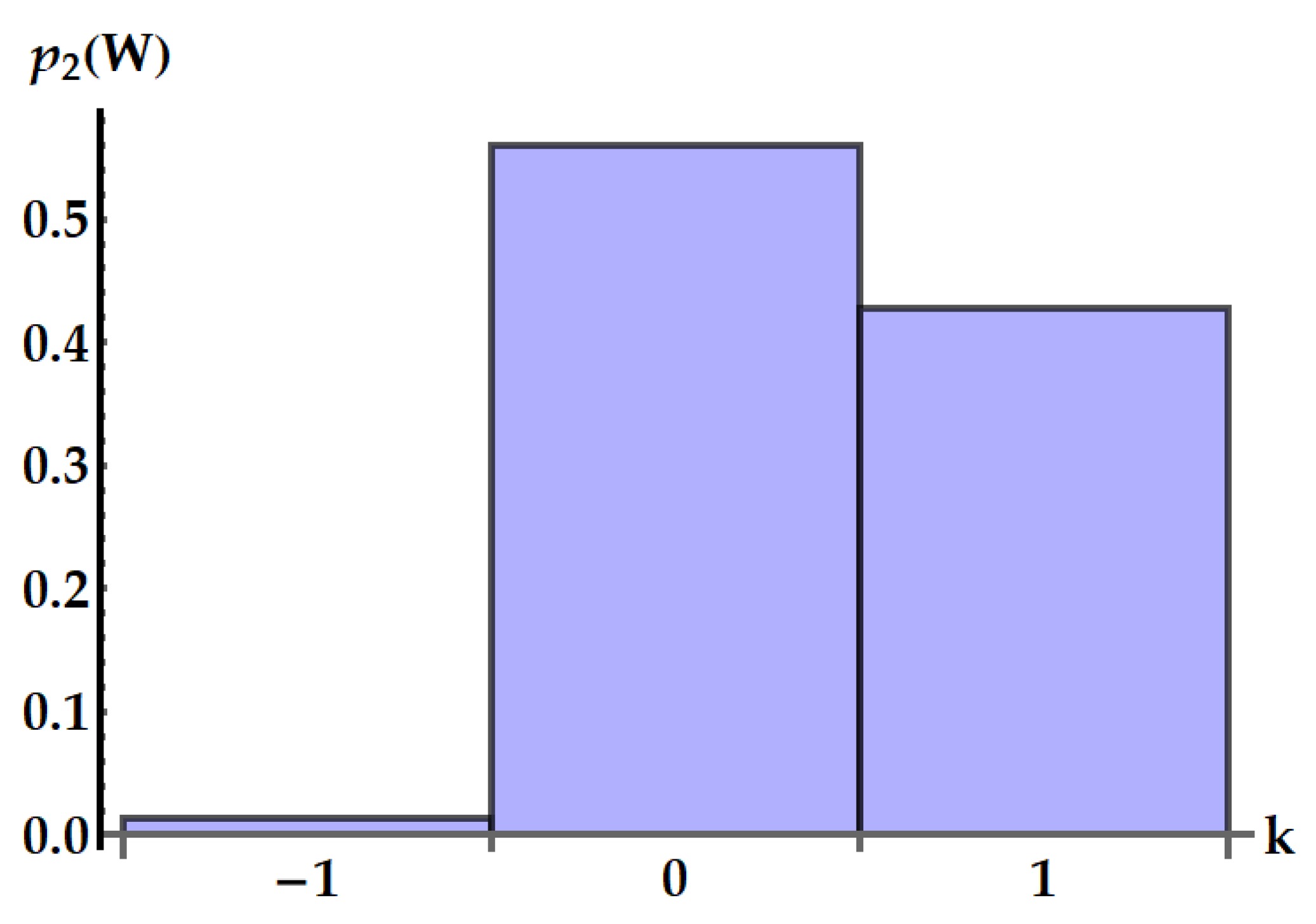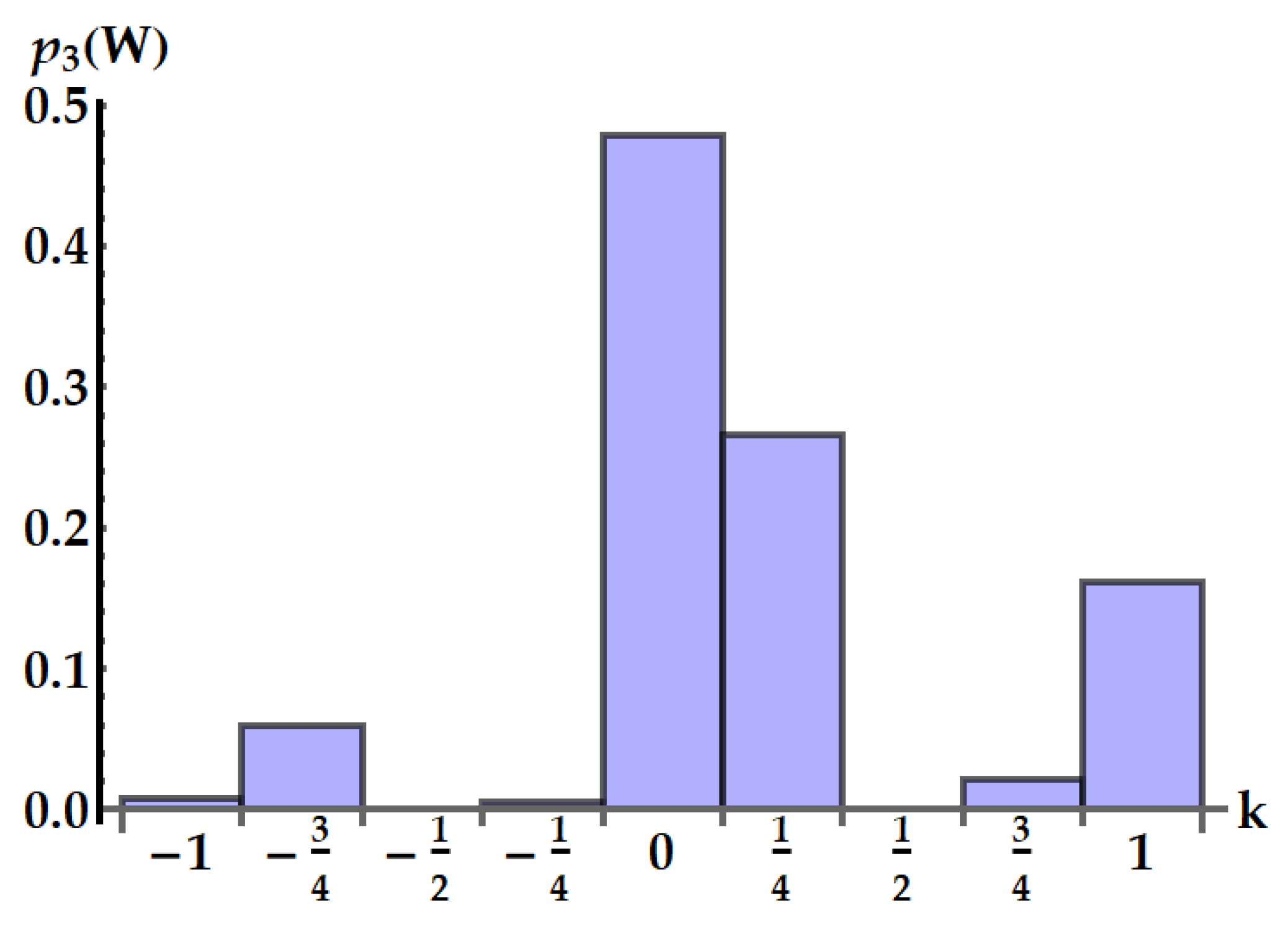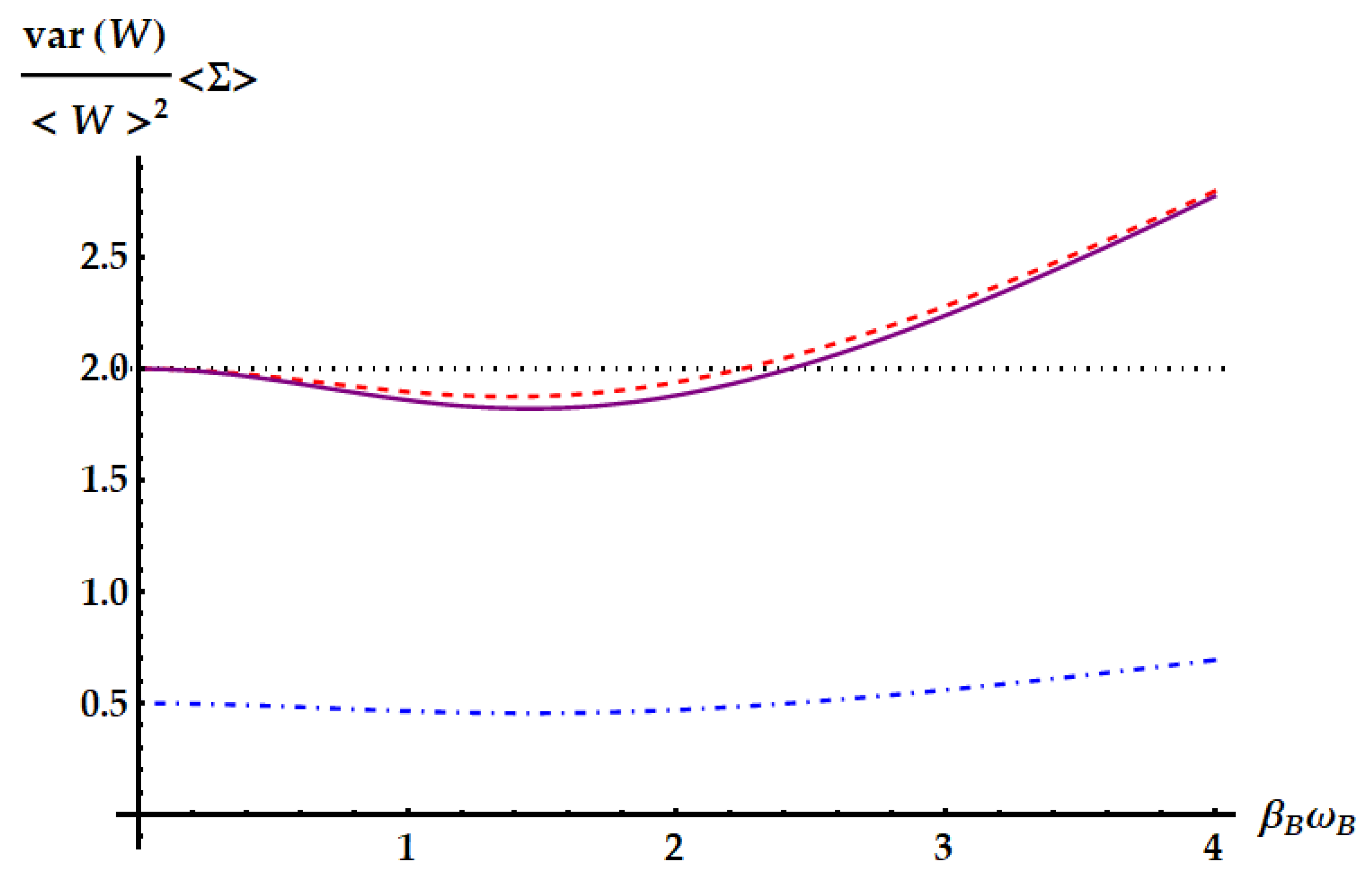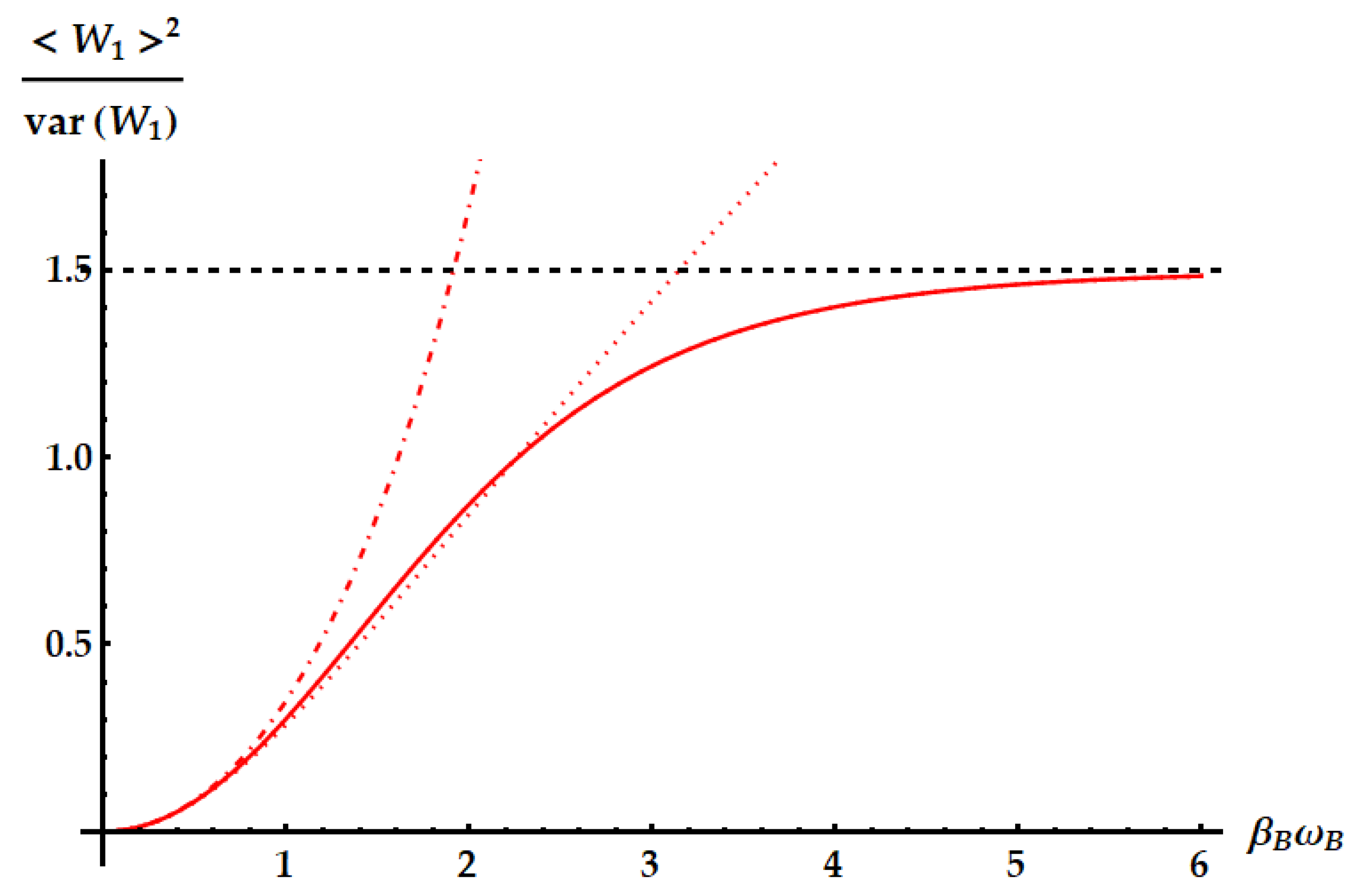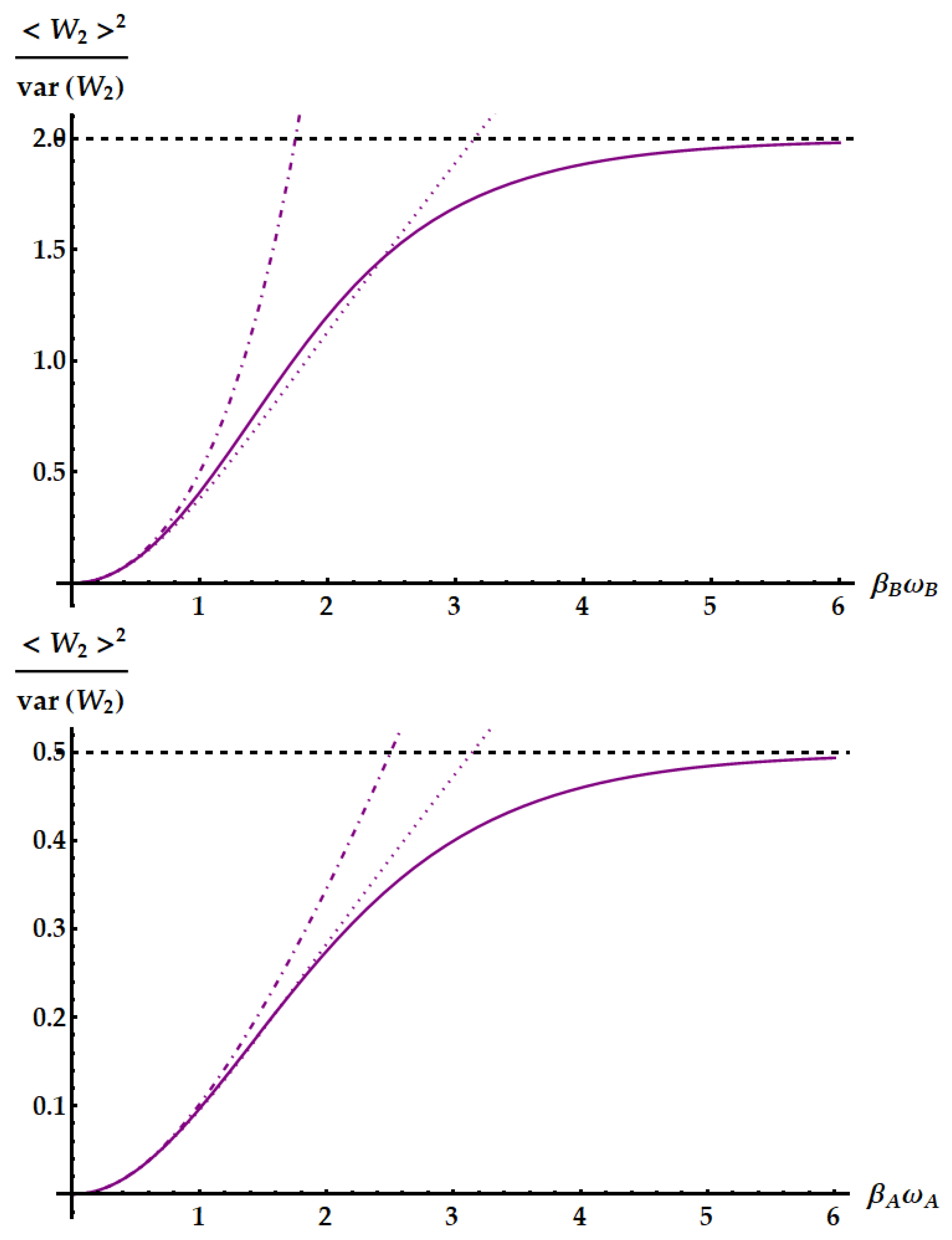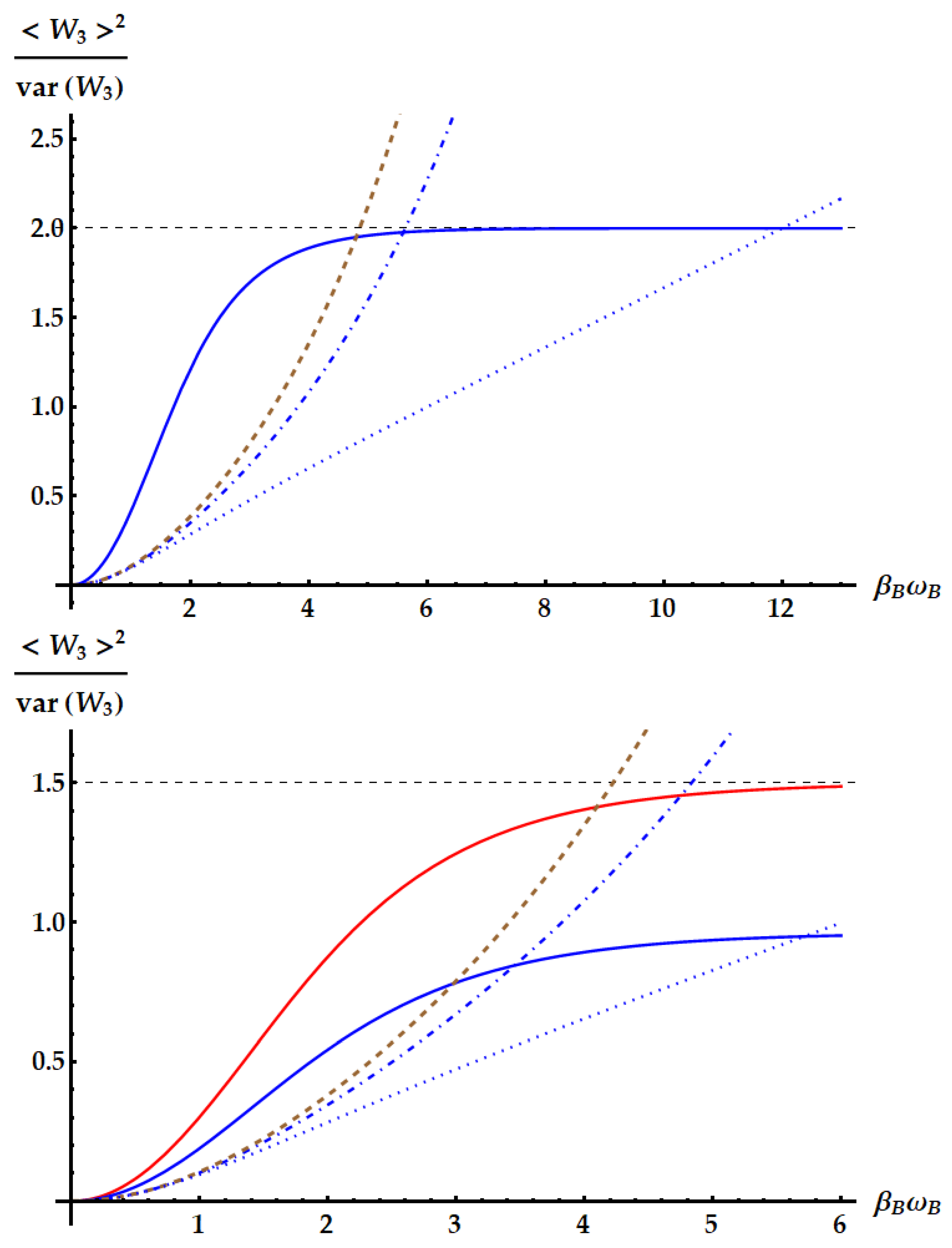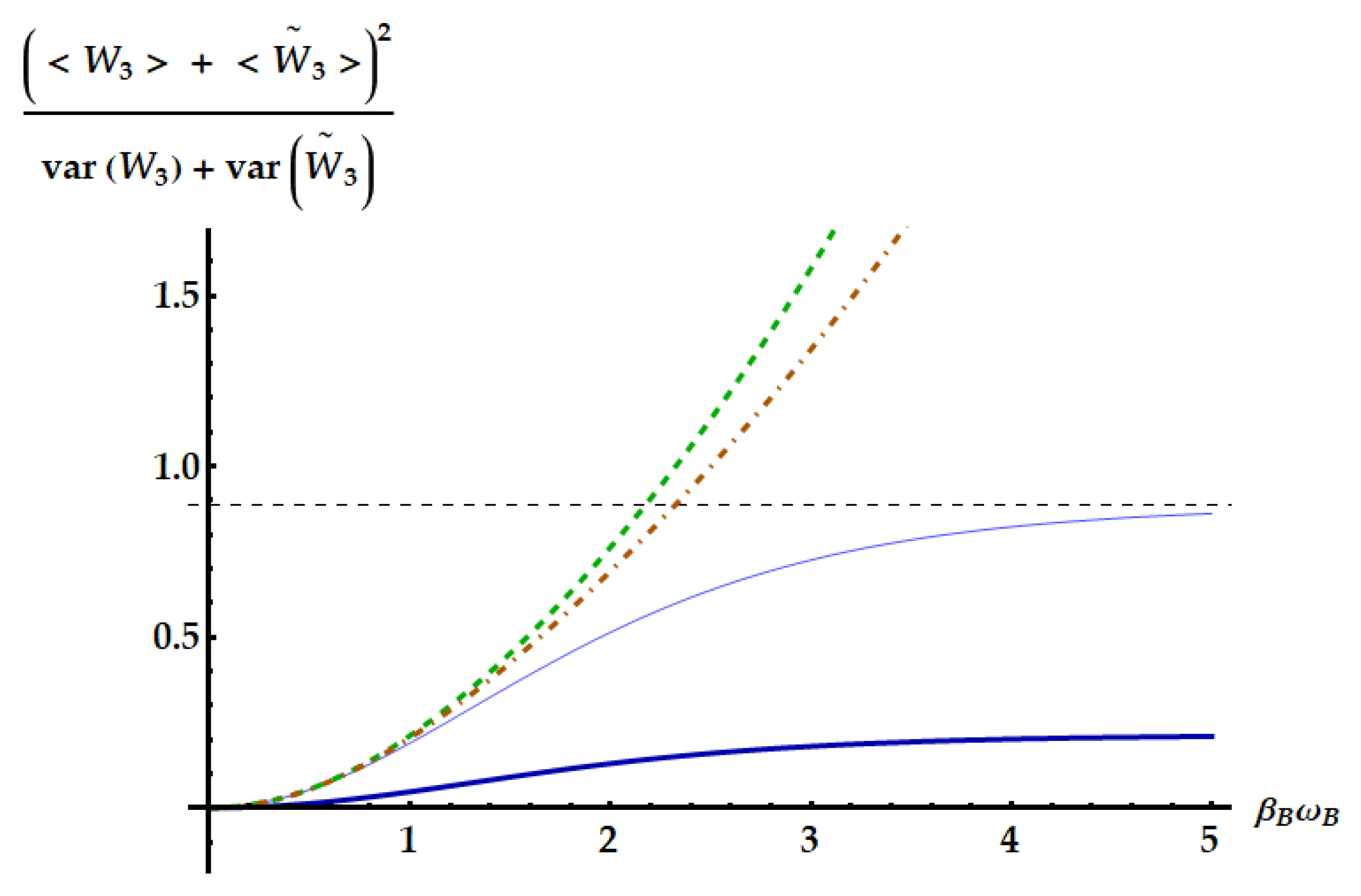2.1. Ergotropic transformations
As mentioned above, we can jointly classify all the ergotropic transformations U and the corresponding ergotropic regimes by inspecting the permutations and .
In the two-qutrit case we have four posets identified by
and
for
, and four identified by
and
for
. We find different permutations
and
for each of the corresponding four posets, i.e. four distinct transformations. We show them associated to the corresponding poset in
Figure 2. Note that, for what concerns
, we have to distinguish three inequivalent cases identified by the relative position of points on the
axis according to the value of the ratio
.
In summary,
and
are simply the identity
I (i.e. no reordering is needed) for
and
, respectively. For
and
, both
and
are given by the swap
, namely
or, equivalently,
, using the cycle notation and the lexicographic ordering where the elements of the cycles are related to the kets as
.
For
and
, both
and
are given by
Finally, for
and
, both
and
are given by
We notice that
and
are not invariant under swap symmetry. In particular,
reads
while
The unitary operators
,
and
are also Hermitian and hence self-inverse. Notice also that
and, similarly,
.
The product
together with the composition rules for
,
and
explored above allows to find the ergotropic transformations for each ergotropic regime identified by combining an
poset with a
poset. In particular, we remark that the ergotropic transformations resulting from the product
must be again
,
,
and
. They are five overall, considering the identity too, which pertains to initial passive states. We provide a direct visualization of the landscape of ergotropic transformations in
Figure 3,
Figure 4 and
Figure 5. Having set
, each figure is linked to a different regime for the ratio
. As outlined in
Figure 2, we can identify three distinct ranges of
with two critical values, namely
and
. For each case, we show the ergotropic transformation related to each poset. In particular, we set
in
Figure 3,
in
Figure 4 and
in
Figure 5. Firstly, we observe that in the first two cases all the transformations found above appear (except
, which pertains to the regime
). In the case of
Figure 5,
is never present and the number of passive regimes becomes four. Notice that in the region
, it is possible to take the limits
and
. In this case, one of the passive regimes disappears and most of the parameter region is dominated by the swap. On the contrary, approaching the critical point
we see that the region where the swap extracts the ergotropy shrinks until it vanishes at the critical point. In the second case, in
Figure 4, the swap plays again a role, but the passive regimes grow as well until, at the critical point
, the ergotropic region of
vanishes and is replaced for
by passive regimes. Of course, at
, the whole frequency subset is passive.
Let us inspect more in detail the non-trivial ergotropic transformations
,
,
and
. The swap
clearly commutes with the total number operator, namely
On the other hand, the evolutions
and
act asymmetrically on the two systems, since they perform a permutation of the frequency levels of
as if the system identified by the smallest frequency gap (
B when the ergotropy is extracted by
and
A when it is extracted by
) were a two-level system, being its intermediate level
left unaffected. Thus, we name
as
idle swap. In fact, for this asymmetry we have
.
Differently from
, the idle swaps
and
enjoy the conservation laws
As for
, being the composition of the standard and the idle swap, we name it
double swap. We noticed above that
is not Hermitian. Indeed, one finds out that the double swap has multiplicative order six, namely
, as it can be inferred from the cycle notation in Eq. (
14). Furthermore, the double swap does not commute with any linear combination of
and
. In
Appendix A, we prove that, if the transformation commutes with a linear combination of
and
, then all work and heat moments are proportional each another and hence the mean entropy production is proportional to the mean extracted work, as we will explicitly show for
,
and
in the next Sections.
2.2. Ergotropy
Now we are ready to provide the mean work of Eq. (
4) extracted by each ergotropic transformation. In the case of the swap
, the ergotropy can be expressed in terms of
units and reads
In the case of the idle swaps
and
we obtain
and
Here we recognize the action described above: the lower frequency qutrit is taken as a qubit whose gap is
for
and
for
, so that the extracted work is proportional to
and
, respectively. As expected, the work extracted from
is obtained from the one extracted by
just by swapping
A with
B. From Eqs. (
20-
22) one also verifies that
where the ratio
is a relevant parameter, as we will find in the following.
In the case of the double swap, we have
Here we see the effects of the atypical behavior of
: the extracted work is not proportional to any frequency gap. On the contrary the frequencies
and
appear multiplied with different weights. Notice that for
one has
and from the second line of Eq. (
24) the double swap
extracts the same work as
, i.e.
. Instead, for
, namely
, one has
and
. Finally, for
we have
and again
. In
Figure 6 we represent the ergotropy extraction in the case
. In particular, we set the ratio
, as in
Figure 3, with
. Note that the pretended discontinuities in the transitions between different ergotropic regions are just cusps, as it can be recognized in
Figure 7,
Figure 8,
Figure 9,
Figure 10 and
Figure 11.
In these figures, we show specific examples of ergotropy extraction as a function of
, by fixing all the other parameters.
Figure 7 displays the case
, with
. Therefore, this is not a critical point and for varying
we span all the non-equivalent ergotropic transformations. The black dot line displays the work extracted from the standard swap
, so that we can see how it is outperformed by the other unitaries outside its own ergotropic regime. Moreover, the solid lines, corresponding to
and
, show that the regime of operation of an ergotropic heat engine is enlarged with respect to the swap Otto engine. In
Figure 8 we consider the critical point
, which represents the transition between the cases in
Figure 3 and
Figure 4, where the ergotropic regime of the standard swap vanishes. Indeed, here we do not have any ergotropic contribution from
, except for the limiting case
, where the work extracted coincides with the one provided by
, identified by the red point. In
Figure 9 we show the ergotropy as a function of
for the critical point
, which is the transition point between the cases of
Figure 4 and
Figure 5. As expected, the double swap
is never required to extract the ergotropy. The maximum work is extracted by the idle swap
for
, by the standard swap
for
and by
for
. For the case
of
Figure 5, we fix in
Figure 10. As in the previous case,
is not needed and, furthermore, there are two more passive regions. Finally, in the last example in
Figure 11, we plot the ergotropy for the ideal case
, by setting
to 0 and finite large values for
and
. In particular, the high value of
allows to see that the extracted work is large when
is large, except for the limiting case
(in such case indeed we would have
, implying
).
In summary, in the regime of operation of the standard swap Otto engine, i.e. , the work extraction may be improved by replacing the swap with the permutation . Moreover, the idle swaps and even allow to enlarge the range of operation of the heat engine.
2.5. Work fluctuations and TURs
Here we evaluate the relative fluctuations of the work extracted by the ergotropic transformations and compare them to the lower bounds identified by different thermodynamic uncertainty relations (TURs).
We can find the relative fluctuations as the ratio between the variance of the extracted work and the square of its mean value, namely
, with
. The second moment of the extracted work can be obtained from the characteristic function as in Eqs. (
A28) and (
A29), and one has
For the standard swap
one obtains
which is in agreement with the general result of the swap engine with two qudits of Ref. [
35]. As expected, the fluctuations of the standard swap are invariant under swapping
A and
B.
For the idle swap
, we have
As for the ergotropy in Eqs. (
21) and (
22), the expression for
is simply obtained by exchanging
A with
B in Eq. (
41). Note that the fluctuations of both the standard and the idle swap depend only on the products
.
This is not the case for the double swap
, which depends also on the frequency ratio
as follows
For all the ergotropic transformations the fluctuations are minimized in the limiting case where
for one qutrit and
for the other one. In the case of the swap, being naturally invariant under swap symmetry, we can either set
to zero and
to infinity or the other way around. On the contrary, the case of the idle and the double swap is asymmetric and we achieve the minimum of the fluctuations for
in the case of
and for
in the case of
and
. Here we mainly focus on the transformations that extract the ergotropy in the same poset identified by the products
. In particular, we choose the poset defined by
, where the optimal evolutions are
,
and
. In the case of the double swap
, the minimization has to be performed also on the frequency ratio and the infimum is obtained for
. The optimization of the fluctuations over the whole span of the parameters readily provides
Therefore, it turns out that
and
achieve smaller fluctuations than
.
We will now investigate if damping the noise comes together with the extraction of the ergotropy. While for
this is always the case, the same is not true for
and
. The idle swap
extracts the ergotropy for
, where the condition for the minimization of fluctuations corresponding to
does not hold. Interestingly, in that region it is
the ergotropy extractor. Within the ergotropic region of
, we need to take
, which provides
. For
, on the contrary, the condition on the ratios
for optimal fluctuations is compatible with the extraction of ergotropy, but with the additional constraint
. The minimization over
x then sets it to
, and, as discussed after Eq. (
24), for that frequency ratio
. To sum up, if we aim to optimize the noise inside the ergotropic regimes of each ergotropic transformation, we find that the best performance is achieved by the standard swap, since
In this last regime where ergotropy extraction and minimal noise coexist, we finally note that the standard swap extracts more work than the idle and double swap. In fact, one has
We remark that the results found so far do imply that the standard swap is the best operation in terms of fluctuations and extracted work in the optimal limiting case
, but the same does not hold for intermediate values of
, as we shall see in the following.
Now we compare the relative fluctuations of the ergotropic engine in asymptotic and non-asymptotic cases with the bounds derived from the most significant TURs. We recall that the double swap
is not Hermitian. Therefore, as remarked in the Appendix after Eq. (
A26),
could violate all the TURs based on the equivalence between forward and backward processes. On the other hand, we already know from previous works [
35] that the swap itself breaks the standard TUR in Eq. (
2). We study in
Figure 15 the violation of the standard TUR as a function of
in conditions of minimal fluctuations, independently from the ergotropic regime. Namely, in the case of
(red dashed line),
(purple solid line) and
(blue dot-dashed line) the free variable is
with
. Just for
, we also need
. We remark that here we are not focusing on the ergotropy extraction, but only on the properties of the evolutions
,
and
in terms of work fluctuations. We find that all the three ergotropic transformations break the standard thermodynamic uncertainty relation. In particular, the violation due to
is impressive. As found in [
35], when the evolution is the standard swap the relative fluctuations for the extracted work satisfies
The variation of Eq. (
46) from the standard TUR explains the slight violation found in
Figure 15, where the lower bound from the standard TUR is displayed as a black dotted line. Similarly to
, also
and
satisfy Eq. (
46). In fact,
where
which satisfies
The fluctuations originated from
, instead, can break the TUR in Eq. (
46). Such violation stems from the asymmetry of the process described by
, which is not Hermitian. Indeed, we note that a necessary condition for the TURs in Eqs. (
2) and (
46) to hold is the equivalence between forward and backward process, i.e.
. Moreover, note that the double swap is the only transformation whose fluctuations depend also on the frequency ratio, while leaving the mean entropy as a function of just
and
. Therefore, in this case we can optimize over a third parameter without changing the lower bound of the TUR.
The violation of the TUR in Eq. (
46) by
can be found also in realistic cases, i.e. even if we do not set the parameters to the values minimizing the fluctuations. Actually, these cases are the most relevant to be considered, not only because closer to experimental applications but especially because they keep into account the ergotropy extraction provided by the different evolutions. For instance, consider the case of
Figure 7, where
,
,
and
is left free. Correspondingly, in
Figure 16 we plot the signal-to-noise ratio (SNR) of the extracted work for each transformation in its ergotropic regime, together with the lower bound of Eq. (
2) (dotted lines). Firstly, note that the double swap violates the TUR even if we are far from the optimal conditions on the parameters maximizing the SNR. Second, the TUR is violated in both regimes where
extracts the ergotropy (
). Third, differently from what we found in the case of optimal conditions,
and
can achieve better SNRs than the standard swap
where the ergotropy is extracted.
The standard TUR is not the only relevant lower bound which we show in
Figure 16. The tightest TUR that cannot be violated by any time-symmetric process was found in Ref. [
33] and, applied to the extracted work, reads
where
is the inverse of the function
. Therefore, we expect that nor
neither
can violate this TUR, while
in principle can. This is what we see in
Figure 16, where the dot-dashed lines corresponds to the lower bound determined by Eq. (
50): the SNR identified by the double swap
is the only one that can violate the tight TUR, also within its ergotropic regime.
We focus more in detail on the violation of the TURs above in
Figure 17,
Figure 18 and
Figure 19, where we plot the SNRs for the three evolutions both for optimal values of the parameters independently from the ergotropy extraction and within the corresponding ergotropic regime. In particular,
Figure 17 displays the performance of the standard swap
. Here we set
, which implies that the fluctuations are minimized for large
. As
increases, the signal-to-noise ratio approaches the inverse of the minimal fluctuations, namely
, in agreement with Eq. (
43). Again, we find a slight violation of the standard TUR (dotted line).
In
Figure 18 we show the performance of the idle swap
where it maximizes the SNR (first panel) and where it extracts the ergotropy (second panel). Therefore, in the former case we set
and retrieve the optimization of the SNR for large values of
, as in Eq. (
43). In the regime where
extracts the ergotropy, as in Eq. (
44), we find an optimal SNR approaching
for
and an almost negligible violation of the standard TUR. Neither the standard nor the idle swap violate the tight TUR in Eq. (
50), displayed as a dashed-dotted line.
The case of the double swap, displayed in
Figure 19, is radically different. If we neglect the conditions for the ergotropy extraction, here we can optimize also over the frequency ratio
and we can set it to zero, while
, implying that we expect to find the optimal SNR for large
, as in Eq. (
43). Again, the standard TUR is violated, but, compared with the previous cases, the corresponding bound is saturated for larger values of
, where the SNR approaches its maximum. Most importantly, the tight TUR of Eq. (
50) is also violated, both when the SNR is optimized (first panel) and when the ergotropy is extracted (second panel).
We also compare the SNR of
with the loosest bound that always holds for time-symmetric processes [
21,
31,
34] given by
The bound from Eq. (
51) is displayed as a brown line in
Figure 19. The violation that we find is a consequence of the fact that
is not Hermitian.
In the second panel of
Figure 19, as mentioned above, we explore the performance of the double swap
in its ergotropic regime, where
. The best performance is obtained for
, where the amount of work extracted by
is the same as the one extracted by
(red line in
Figure 19). We also plot the case
, in blue. We get a worse SNR, but still can observe a violation of all the TURs derived for time-symmetric processes.
The only TURs that can set a bound which cannot be violated by
are those obtained without posing the symmetry between forward and backward process. In fact, the TURs in Eqs. (
50) and (
51) have been generalized respectively in Refs. [
39] and [
32] by releasing the assumption that forward and backward processes share the same distribution of the stochastic variables. These new bounds are given by
and
where the quantities with subscript
B are referred to the backward process and
. In the case of
, the statistics of
W for the backward process is easily found since
. Hence,
outputs the same work statistics as
provided that systems
A and
B are swapped. Then,
,
and
can be obtained from Eqs. (
24), (
28) and (
42) simply swapping labels
A and
B. Note also that the bounds (right-hand sides) given by the TURs in Eqs. (
52) and (
53) depend only on the products
, while the corresponding bounded quantities depend also on the frequency ratio
.
In
Figure 20, we compare the reciprocal of the left-hand sides of Eqs. (
52) and (
53) for
with the corresponding bounds as a function of
with fixed
. In this regime
maximizes the SNR. We show the two limiting cases
(thick dark-blue curve) and
(thin light-blue curve) together with the bounds obtained from the TURs in Eqs. (
52) and (
53), identified by the dot-dashed brown curve and the dashed green curve, respectively. Note that these TURs are never violated and, as expected, the first is tighter than the second. Having set
, the maximum is asymptotically reached for
and
, and amounts to
(dashed horizontal line in
Figure 20).
